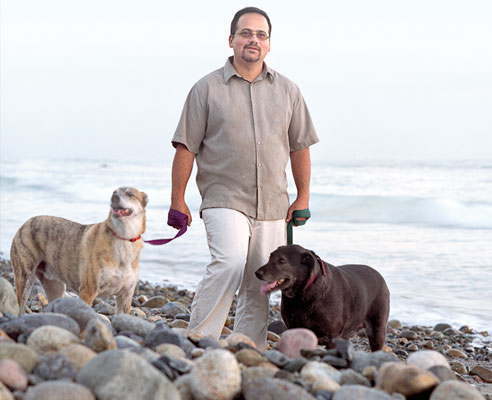No.02
First, about a guy named Nathan Winograd. Nathan was the number two person at the San Francisco SPCA. And what you may not know about the history of the SPCA is, it was founded to kill dogs and cats. Cities gave them a charter to get rid of the stray animals on the street and destroy them. In a typical year four million dogs and cats were killed, most of them within 24 hours of being scooped off of the street. Nathan and his boss saw this, and they could not tolerate it. So they set out to make San Francisco a no-kill city: create an entire city where every dog and cat, unless it was ill or dangerous, would be adopted, not killed. And everyone said it was impossible. Nathan and his boss went to the city council to get a change in the ordinance. And people from SPCAs and humane shelters around the country flew to San Francisco to testify against them — to say it would hurt the movement and it was inhumane. They persisted. And Nathan went directly to the community. He connected with people who cared about this: nonprofessionals, people with passion. And within just a couple years, San Francisco became the first no-kill city, running no deficit, completely supported by the community. Nathan left and went to Tompkins County, New York — a place as different from San Francisco as you can be and still be in the United States. And he did it again. He went from being a glorified dogcatcher to completely transforming the community. And then he went to North Carolina and did it again. And he went to Reno and he did it again.
And when I think about what Nathan did, and when I think about what people here do, I think about ideas. And I think about the idea that creating an idea, spreading an idea has a lot behind it. I don’t know if you’ve ever been to a Jewish wedding, but what they do is, they take a light bulb and they smash it. Now there is a bunch of reasons for that, and stories about it. But one reason is because it indicates a change, from before to after. It is a moment in time. And I want to argue that we are living through and are right at the key moment of a change in the way ideas are created and spread and implemented.
ボキャブラリー
First, about a guy named Nathan Winograd. Nathan was the number two person at the San Francisco SPCA. And what you may not know about the history of the SPCA is, it was founded to kill dogs and cats. Cities gave them a charter to get rid of the stray animals on the street and destroy them. In a typical year four million dogs and cats were killed, most of them within 24 hours of being scooped off of the street. Nathan and his boss saw this, and they could not tolerate it. So they set out to make San Francisco a no-kill city: create an entire city where every dog and cat, unless it was ill or dangerous, would be adopted, not killed. And everyone said it was impossible. Nathan and his boss went to the city council to get a change in the ordinance. And people from SPCAs and humane shelters around the country flew to San Francisco to testify against them — to say it would hurt the movement and it was inhumane. They persisted. And Nathan went directly to the community. He connected with people who cared about this: nonprofessionals, people with passion. And within just a couple years, San Francisco became the first no-kill city, running no deficit, completely supported by the community. Nathan left and went to Tompkins County, New York — a place as different from San Francisco as you can be and still be in the United States. And he did it again. He went from being a glorified dogcatcher to completely transforming the community. And then he went to North Carolina and did it again. And he went to Reno and he did it again.
And when I think about what Nathan did, and when I think about what people here do, I think about ideas. And I think about the idea that creating an idea, spreading an idea has a lot behind it. I don’t know if you’ve ever been to a Jewish wedding, but what they do is, they take a light bulb and they smash it. Now there is a bunch of reasons for that, and stories about it. But one reason is because it indicates a change, from before to after. It is a moment in time. And I want to argue that we are living through and are right at the key moment of a change in the way ideas are created and spread and implemented.
Nathan Winograd: ネイサン・ウィノグラッド。アメリカ人の作家、映画制作者、動物の弁護士、the No Kill Advocacy Center所長
SPCA: = Society for the Prevention of Cruelty to Animals(動物虐待防止協会)
found: vt. 〜を設立する、建てる、創立する;〜に基礎を置く
charter: n. 特許(状)、免許書(状)、認可状;特権、特別免除
get rid of ~: 〜を駆除する、取り除く、処分する、一掃する
stray: a. 道に迷った、はぐれた、それた
stray animal: 迷い動物(野良犬・野良猫など)
destroy: vt. (動物)を殺処分する、殺す;〜を破壊する、壊す、滅ぼす
typical: a. 標準的な、典型的な、普通の、いつもの
scoop: vt. 〜をかき集める、すくい取る
off of ~: 〜から
tolerate: vt. 〜を大目に見る、黙認する、許す、許容する;〜を我慢する、〜に耐える
set out to ~: 〜することを目指す、〜しようとする、〜し始める
no-kill: n. ノーキル【ペットなどを殺さない動物保護またはその設備】
unless: conj. 〜でない限り、〜しない限り、〜の場合を除いては、もし〜でなければ
adopt: vt. (人・動物など)を引き取る、〜を養子にする、(習慣など)を取り入れる
city council: 市議会
ordinance: n. (主に都市の)条例
humane: a. 人道的な、慈悲深い、苦痛を与えない
shelter: n. (ケガをした動物などの)保護施設[センター]
around the country: 国中の
testify against ~: vi. 〜に不利な証言をする
inhumane: a. 非人道的な、無慈悲な;残酷な、残虐な
persist: vi. しつこく主張する、言い張る;あくまでやり通す、押し通す
nonprofessional: a. 本職でない、プロでない、素人の、ノンプロの
run: vt. (費用などが)かかる
deficit: n. 不足額、赤字、欠損
glorified: a. 見せかけの、実際より良く見せた
dogcatcher: n. 野犬捕獲者、野犬捕獲人
transform: vt. 〜を変貌させる、すっかり変える、一変させる
spread: vt. 〜を広める、広げる、拡大させる、普及させる
Jewish: a. ユダヤ人の、ユダヤ教の
light bulb: 電球
smash: vt. 〜を粉砕する、粉々にする
indicate: vt. 〜を示す、表示する、表す
implement: vt. 〜を実行する、履行する
解説
Nathan Winograd(ネイサン・ウィノグラッド)
http://www.nathanwinograd.com/
https://www.facebook.com/nathanwinograd

